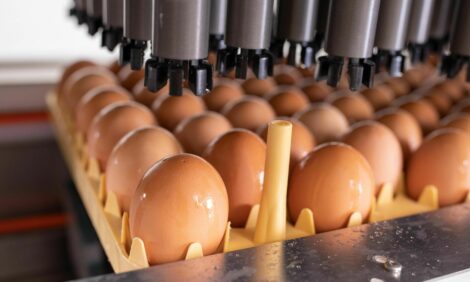



Studying the protection from recombinant HVT IBD vaccines
New research looks at possible gaps in broiler protectionDr. Kalen Cookson, DVM, MAM, DACPV, director of clinical research, Zoetis Poultry, spoke with The Poultry Site’s Sarah Mikesell at the 2023 IPPE in Atlanta, Georgia, USA about recombinant HVT IBD vaccines.
Why have recombinant HVT IBD vaccines become so popular?
The simplest answer to why IBD vaccines are so popular is because they work. They're the most effective – what I call cushion – against IBD infection and the losses or immune suppression that we can apply in the hatchery. They not only help cushion early, when maternal antibodies are starting to wane, but their duration of immunity is very solid. Once you have immunity, it will last for the life of the broiler.
Why is the AL2 virus used in so many IBD challenge studies today?
AL2 virus is used in many IBD studies mainly because it's still the most predominant variant type that we have in the United States. It has been for about the last two decades. It's the most relevant virus and covers most geographies in the US where people are raising broilers.
Broiler progeny challenge studies are often performed at two weeks of age, why is that?
This goes back to the immunity that we're trying to provide from a maternal antibody standpoint and the IBD effect based on timing of the infection. If you have an IBD infection by two weeks or sooner, we're very confident the flock is going to suffer from immune suppression. The single most crucial goal that we have in broilers is to get them past that two-week window that's most damaging.
What is the biggest take-home message from your IPSF presentation at the conference?
In 2023, we presented data where we had done our AL2 challenges at 18 to 19 days of age. We wanted to look on both sides of those windows to see what kind of protection we would see from that against the same AL2 challenge.
When we presented that data to customers last year, they still had questions about the results from around two weeks or later at 3 weeks or more? They thought their maternal immunity program with breeders was pretty good and that they were getting protection out three weeks or later. So, they wanted to know what type of effect these vaccines can have, and the results of the challenges performed at the later time limit.
By 25 days, even the best breeder program is not going to have any meaningful maternal immunity. It's going to be dependent on the active immune program, which is based on the vaccines given in ovo.
Why did you challenge broilers at 25 days of age and did you see a difference?
Some customers said they felt like 25 days was more in line with when their birds were challenged. But with that comes the fact that there are some who don’t believe there’s a benefit to providing protection out that late because we mention that the most important time period is at two weeks. But what we also know about IBDV is that a late infection often can cause a temporary level of immune suppression.
It may not be as profound. It's more modest, and it may last 7 to 10 days at most. But if you have other disease challenges that are occurring during that four-week window, it can be quite significant on performance. So, we wanted to look at what type of cushion we can provide from in ovo vaccination in that window as well and the cushion was significant.
In fact, in a subsequent study we’ve presented this year, we demonstrated that a 3-week AL2 challenge suppressed immunity to infectious bronchitis.1 And the kicker was that this IBDV-induced immune suppression was actually prevented when birds received a recombinant vaccine in the hatchery—that cushion, if you will.1
Learn more about recombinant HVT IBD vaccines.
Reference:
1 Data on file, Study Report No. RM-0Q0-KC7631, Zoetis Inc.
All trademarks are the property of Zoetis Services LLC or a related company or a licensor unless otherwise noted.
© 2024 Zoetis Services LLC. All rights reserved. BIO-00415










